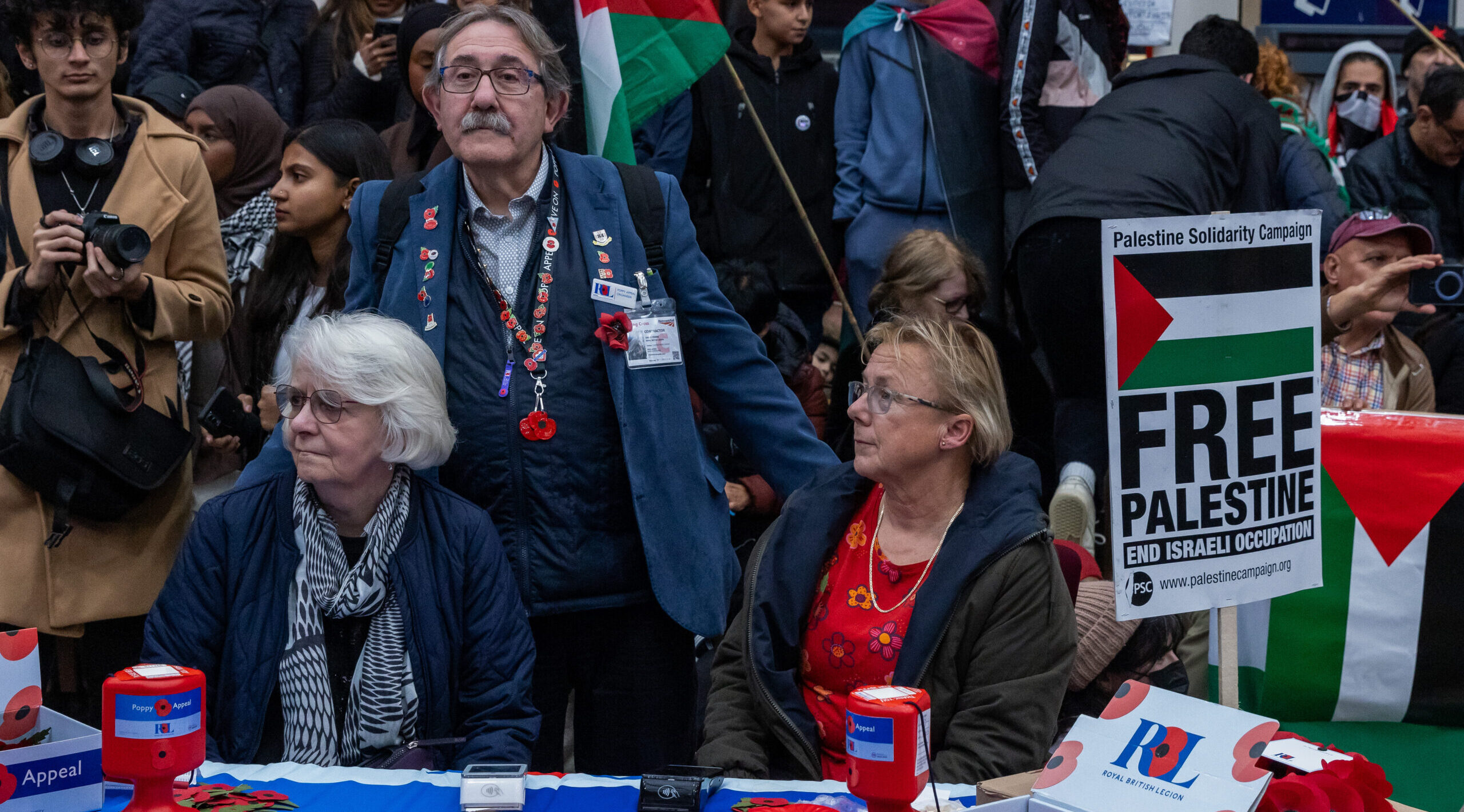The Y2K era is apparently fashionable again, in politics as well as clothes and music. As the British commentariat works itself into a fever of anticipation over the prospect of disorder at the Cenotaph this weekend, it’s hard to shake off the feeling that the war in Gaza has brought about a strange revival of 2000s discourse. While in London poppies are now rarely beheld on anyone neither on television nor in uniform, and the passage of time has removed the quietly dignified war-veteran poppy sellers from Britain’s streets, today’s expanded cultural salience of “the “Festival of Remembrance” is arguably a product of the War on Terror era.
Like Help for Heroes and Gordon Brown’s sudden and unconvincing creation of Armed Forces Day, the explosion of poppy imagery was, back then, spurred by popular discontent over British soldiers being sent under-equipped to fight pointless wars in the greater Middle East, against a backdrop of insufficient respect at home. Without Osama bin Laden, we can say, there would have been no Captain Tom.
Then as now, anxieties over immigration and integration circled around Remembrance imagery: it was the Islamist provocateur Anjem Choudary’s al-Muhajiroun group’s poppy-burning on Remembrance Sunday, and its heckling of Royal Anglian troops returning home, that gave birth to the EDL. Similarly, the current wave of anxious Armistice Day discourse was sparked by a vague threat from Dilly Hussain, Deputy Editor of the Muslim website 5 Pillars, encouraging a “resounding rejection” of the two minutes’ silence “this year and for many years to come”.
In response, as if by magic, pro-Israel activist and ex-EDL leader Tommy Robinson was unbanned by Twitter, announcing a gathering of his faithful followers to confront the presumed sacrilegious hordes at the Cenotaph. Even the muscular liberals of the War on Terror era, like Douglas Murray — now more muscular, if less liberal — have insisted that “the people of Britain must come out and stop these barbarians.” The Metropolitan Police, in its own inimitable style, has simultaneously urged the protest not to go ahead while insisting it has no cause to ban it, setting off a media cycle of its own.
Whether or not the proposed pro-Palestine march at the centre of this angst is a worthy object of all this cultural baggage is disputable: the event is not planned to pass anywhere near the Cenotaph, and will start hours after the moment of silence itself. Yet somehow this year’s Armistice Day has found itself inextricably interwoven with the current conflict, and Britain’s divided response to a distant war whose outcome it is powerless to influence in any way. Conservatives who anticipate, more in hope than fear, that disorder on the day will shock Middle England into a rejection of multiculturalism may be disappointed: previous protests have been largely peaceful and in any case a majority of Britain’s population supports a ceasefire.
Yet what is most interesting, perhaps, is the response to the planned counter-protests from Britain’s younger Right-wing cohort, no friends to either multiculturalism or mass immigration. Instead of demanding counter-protests, the overwhelming Twitter reaction to Robinson’s rallying cry from Right-wing activists was an insistence such activity would be an optics own goal, or even a trap to reset the media narrative away from pro-Hamas radicals towards a focus on shaven-headed ethnic British louts (citing the outcome of the 2020 George Floyd protests).
Where the Rightists of the New Labour era see the weekend’s protests as an opportunity to defend the British state and its institutions, those of the 2020s are accelerationists, convinced the current order is doomed to failure and happy to let its untenable contradictions reveal themselves without their input. The seeming revival of War on Terror discourse is, then, only an illusory media artefact: the radicalisation of British politics is proceeding in quite another direction.











Join the discussion
Join like minded readers that support our journalism by becoming a paid subscriber
To join the discussion in the comments, become a paid subscriber.
Join like minded readers that support our journalism, read unlimited articles and enjoy other subscriber-only benefits.
Subscribe